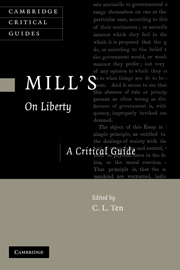Book contents
- Frontmatter
- Contents
- List of contributors
- Mill's On Liberty: Introduction
- 1 Mill's case for liberty
- 2 Mill's liberal principles and freedom of expression
- 3 Racism, blasphemy, and free speech
- 4 State neutrality and controversial values in On Liberty
- 5 Rawls's critique of On Liberty
- 6 Mill on consensual domination
- 7 Autonomy, tradition, and the enforcement of morality
- 8 Mill and multiculturalism
- 9 Mill, liberty, and (genetic) “experiments in living”
- 10 John Stuart Mill, Ronald Dworkin, and paternalism
- Bibliography
- Index
2 - Mill's liberal principles and freedom of expression
Published online by Cambridge University Press: 01 July 2009
- Frontmatter
- Contents
- List of contributors
- Mill's On Liberty: Introduction
- 1 Mill's case for liberty
- 2 Mill's liberal principles and freedom of expression
- 3 Racism, blasphemy, and free speech
- 4 State neutrality and controversial values in On Liberty
- 5 Rawls's critique of On Liberty
- 6 Mill on consensual domination
- 7 Autonomy, tradition, and the enforcement of morality
- 8 Mill and multiculturalism
- 9 Mill, liberty, and (genetic) “experiments in living”
- 10 John Stuart Mill, Ronald Dworkin, and paternalism
- Bibliography
- Index
Summary
Chapter 11 of On Liberty contains John Stuart Mill's now classic defense of freedom of expression. This defense of expressive liberties has proved extremely influential and finds important echoes in First Amendment jurisprudence within United States constitutional law. Though important in its own right, Mill's defense of freedom of expression also plays an important, though sometimes overlooked, role in his more general defense of individual liberties. Mill turns to freedom of expression immediately after his introductory chapter in the belief that there is general agreement on the importance of freedom of expression and that, once the grounds for expressive liberties are understood, this agreement can be exploited to support a more general defense of individual liberties.
It will be convenient for the argument if, instead of at once entering upon the general thesis [the defense of various individual liberties], we confine ourselves in the first instance to a single branch of it on which the principle here stated is, if not fully, yet to a certain point, recognized by the current opinions. This one branch is the Liberty of Thought, from which it is impossible to separate the cognate liberty of speaking and writing. Although these liberties … form part of the political morality of all countries which profess religious toleration and free institutions, the grounds, both philosophical and practical, on which they rest are perhaps not so familiar to the general mind … Those grounds, when rightly understood, are of much wider application than to only one division of the subject, and a thorough consideration of this part of the question will be found the best introduction to the remainder.
(CW XVIII, 227 [1, 16])- Type
- Chapter
- Information
- Mill's On LibertyA Critical Guide, pp. 40 - 61Publisher: Cambridge University PressPrint publication year: 2009
- 10
- Cited by

